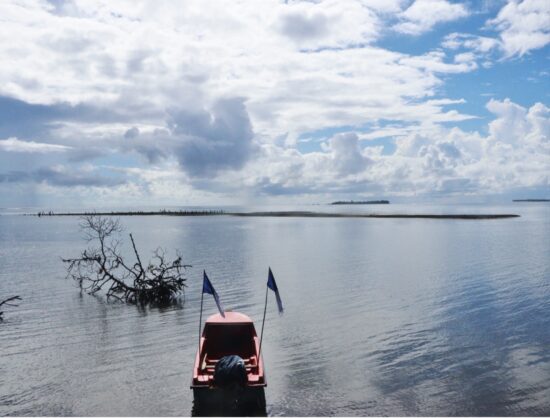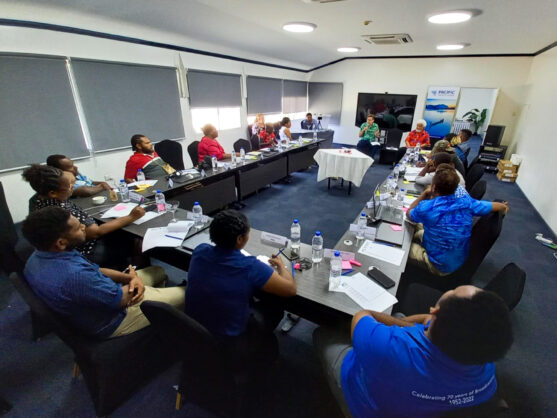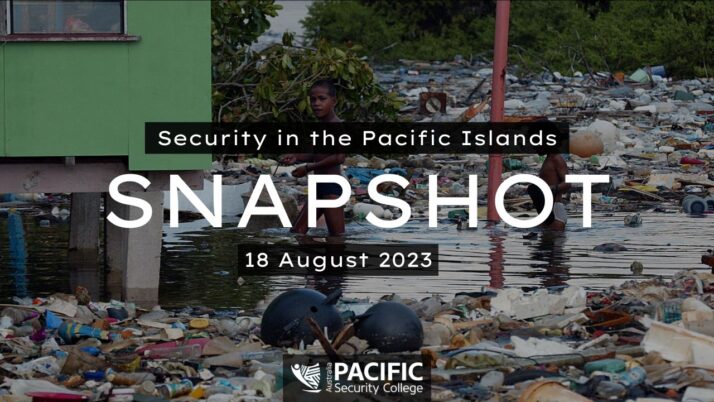Climate Change Threat to Livelihood is a National Concern

In front of the fibreglass boat is the third Walande Island settlement that was washed away by king tides and sea-level rise. Photo: Esther Nuria
Climate change is a threat to the livelihood of village people living in coastal areas of Solomon Islands. Esther Nuria highlights one example locals say the government should take seriously.
For the people of Walande, in Small Malaita, the present village built on the mainland is their fourth settlement since their ancestors settled there generations ago.
In an interview with the Solomon Star Newspaper, Richard Qa’ai, Chairman of the Disaster Committee on Walande said climate change has affected his people – the island they have spent their childhood on is no more.
“Our land has already been washed away. Mangroves we depend on, the shells and our fishing spots have been destroyed from coastal erosion. Sea level rise has severely affected our livelihood.
“As coastal erosion continues, control measures such as landfill using rocks must be employed. Otherwise our people will have to move houses inland,” Qa’ai said.
Prior to becoming the Chairman of his community’s disaster committee, Mr Qa’ai was a former World Vision Solomon Islands officer who had done a case study called “Climate Change Risk on Walande Island through a Transition.”
From his research findings, Qa’ai said the new Walande Village on the mainland was purchased by their grandfathers in 1954 from the landowners of Small Malaita and today the land is limited due to increasing population.
“Land is limited and it causes yielding of crops to reduce because we repeatedly planted crops in the same plot of area over the years,” Qa’ai said.
He then shared a brief history of Walande island through its transition and how the livelihood of its people has been affected by the effects of climate change over the years.
He said people of Walande have their origin in Ata’a, north-east Malaita. They ‘emigrated” to Walande many years back.
“The people represent the three main tribes from Ata’a, namely Suraina, Talito and Farere. They made their voyage along south-east coast of Malaita and finally settled in Small Malaita. The fourth tribe of people also known as Malau also ended up the same way at a separate voyage. This group is said to have their origin in Fanakafo in East Malaita,” he said.
Qa’ai added the first people of Walande settled down and made friends with the chief of Po’omweimei in Small Malaita and became very good friends. They settled on two small islands named Hile and Namo about one kilometer away from the main land. The two islands were suddenly washed away in 1937. Some 84 years on this has now turned into a shallow reef where waves are breaking.
He said in 1940 people built another artificial island about 200 meters away from the mainland. But was washed away with the effect of climate change that intensified and increased sea level rise that brought king tides which destroyed the island and today only posts of the houses can be seen at the island.
“It is a national issue and it is something the government should seriously consider,” Mr Qa’ai said.
“The government has been talking about the low lying areas for years now, and yet nothing tangible has been done. I wish to say it again that this is a national issue which the government should take seriously before it is too late,” Mr Qa’ai said.
Susan Fakaia, an elderly Walande woman and retired nurse by profession, stated that women and children were mostly affected during those years.
“Our livelihoods have been affected badly compared to men. Because we women enjoyed our livelihood on the island,” Ms Fakaia said.
She said women and children have gone through nervous breakdowns during these events and women have lost a lot of household utensils.
“After the disaster malaria then affected us when living on the mainland. This brought fear to the villagers during those times,” Ms Fakaia said.
One of the chiefs in Walande, Andrew Dora’adi, showed the land their ancestors purchased from the Small Malaita Po’omweimei landowners which he said is now limited in size due to increasing population.
He said the livelihood of the people of Walande is now dependent on the land purchased by their grandfathers.
“But once the population continues to increase we will experience land shortage.
“It is now happening because our population has now started to increase and families argue over plots of land for gardening. Also we cannot make gardens out of the boundaries our grandfathers purchased because it belongs to the landowners of Small Malaita.
“Land scarcity will badly affect the livelihood of the Walande people. This is an issue the national government must think seriously about and find solutions to address it,” Dora’adi said.
Esther Nuria
* Esther Nuria won “best story” with this article while participating in a national security reporting course conducted by the Pacific Security College (PSC) and the Media Association of Solomon Islands (MASI).
More Stories

Media Releases - 18 Sep 2023
National Security Reporting Course, Solomon Islands
PSC is pleased to have supported the Media Association of Solomon Islands (MASI) for the delivery of their National Security Reporting Course 2023. Journalists play an important role in updating and educating communities about security issues that affect them. Through effective sourcing and sharing of accurate and reliable information, robust local journalism can help foster…

Security Snapshot - 18 Aug 2023
Pacific Security Snapshot | 18 August 2023
The security stories shaping the region ➣ Pacific Resilience Facility endorsed at the Forum Economic Ministers Meeting ➣ The Pacific Climate Security Assessment Guide ➣ French President Macron visits Papua New Guinea and Vanuatu ➣ US Secretary of State and Secretary of Defence in the Pacific ➣ Bougainville eruption leaves 8,000 displaced Climate Security Ministers…






